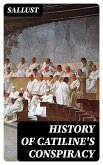In "Conspiracy of Catiline," Gaius Sallustius Crispus, a prominent Roman historian and politician, delves into one of the most infamous political conspiracies of the Roman Republic. Written in a vivid and engaging prose style, the text employs a dynamic narrative that captures the tension and moral decay surrounding Lucius Sergius Catilina's plot to overthrow the government in 63 BCE. Sallust's work is noteworthy for its use of psychological insight into the motives of its characters, as well as for highlighting the contrasts between the virtues of the past and the vices of contemporary Roman society. The historical context of the late Republic, marked by corruption and social unrest, serves as a backdrop that enriches the text's exploration of power, ambition, and betrayal. Sallust's background as both a soldier and politician influenced his writing, shaping his perspectives on morality and governance. His experiences, including his later detachment from political life due to disillusionment with the corruption prevalent in Roman politics, imbue the narrative with an authenticity and urgency, making it a critical commentary on the psychology of power. His focus on characters like Cicero, and the moral repercussions of their actions, reveals a profound understanding of human nature amid political tumult. "Conspiracy of Catiline" is essential reading for students of history, literature, or political science, offering timeless insights into political ambition and ethical responsibility. Readers will find a compelling tale that resonates with contemporary issues, making it a relevant text for anyone interested in the complexities of leadership and the consequences of conspiracy. Bask in Sallust's enlightening examination of ambition and morality, and discover the intricate interplay of power in one of history's pivotal moments.
Dieser Download kann aus rechtlichen Gründen nur mit Rechnungsadresse in A, B, BG, CY, CZ, D, DK, EW, E, FIN, F, GR, H, IRL, I, LT, L, LR, M, NL, PL, P, R, S, SLO, SK ausgeliefert werden.
Hinweis: Dieser Artikel kann nur an eine deutsche Lieferadresse ausgeliefert werden.









